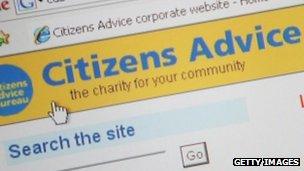Benefits: How to claim your entitlement
- Published

New mothers are among those who are entitled to certain benefits
How can you find out what benefits and tax credits you may be entitled to? Unfortunately, there is not a quick or easy answer to this question.
The benefits system is complex, with more than 50 benefits, allowances, credits, grants and payments available to people who meet the various conditions of entitlement.
So it is no surprise that so many people struggle to claim what they are entitled to.
For example, statistics show that between £12bn and £16bn of mean-tested benefits go unclaimed every year.
How does the system work?
There are particular reasons why the various benefits exist. Each benefit is there for a specific purpose.
It is much easier to understand your own circumstances than it is to understand every individual benefit.
In doing so, it is much easier to look into the various benefits that are available; you do not need technical expertise, just a good understanding of your own situation and why you need some financial help.
For example, somebody who has lost their job, has a partner and children, and who pays rent and council tax, may be entitled to: jobseeker's allowance, child benefit, child tax credit, housing benefit, council tax benefit, free prescriptions, free school meals, help with school uniform, and a warm home discount.
Those with disabilities may receive benefits including employment and support allowance - which can include help for mortgage interest - and disability living allowance, among others.
Pensioners may also have entitlement to a range of benefits that suit their circumstances.
These are very basic examples, but you can see how circumstances directly relate to the benefits that are available.
Start by writing down why you need help. Apart from unemployment or disability, you might be a lone parent or a carer, you could be struggling to pay bills like rent, council tax, water or energy.
You might be working on a low income or you may have children. You could be a pensioner on a low income or a mum on maternity leave.
These are just some of the reasons for needing financial assistance - assistance which may be available from the welfare system in some shape or form.
Which benefits are available?
It always shocks me how many people do not have a sound understanding of the benefits that can be claimed.
We have put together a checklist, external. This will give you a starting point for learning the names of the benefits that might be available to you.

Lee Healey says that people should do their homework on benefits
For example, did you know there are two forms of jobseeker's allowance and employment and support allowance? Do you know the difference between child tax credit and working tax credit? Would you know the help available to you if you were long-term unemployed and moving back into work?
Did you know that housing benefit is available to people that are working - depending on income and circumstances. I wonder just how many pensioners are aware that pension credit has two elements - a guarantee credit (a top-up payment) and a savings credit (that rewards pension provision).
Knowing what benefits are available is especially important as things start to change over the next few years. For example, universal credit will soon replace many working-age, means-tested benefits. Meanwhile, disability living allowance (DLA) for people aged 16 to 64 will soon be replaced by the personal independence payment (PIP).
So, if you are new to looking into your entitlement, start by finding out all the names of the benefits that are available. Then, continue to stay updated as the system will look very different within a few years.
Is advice available?
Speaking to a benefits expert is the best way to find out what you are missing out on, but finding an expert to help is not always an easy task.
An expert is normally someone that understands the entire benefit system and can help you piece together your entitlement.

Various advice agencies can offer help for benefit entitlements
He or she would normally start by talking to you about your circumstances, your current income, savings, health issues and housing costs. They will also ask about outgoings such as rent or mortgage, council tax, energy bills and water bills.
The next stage of the process would be working out your entitlement. There may also be a need for some complex calculations to be carried out. Once you have the results, you can then move forward to making claims to relevant benefits, assuming that there is something you are missing out on.
A benefits expert may also need to provide further support at a later stage, because the award of one benefit can sometimes lead to another.
There are a number of organisations that have benefits experts available to help you. Some provide more general benefits advice, while some are more geared towards specific circumstances.
General guidance providers include: Citizens Advice, external, Advice UK, Age UK, external, and Law Centres, external. Macmillan, external provides assistance for cancer sufferers and their families, Gingerbread, external helps single parents, while Shelter, external advises on housing issues.
Scope/Dial Network, external helps those with disabilities with benefits enquiries. IncomeMAX, external, Turn2us, external, Disability Rights UK, external, all offer internet resources. Information on claiming is available from Gov.uk, external, the Department for Work and Pensions, external, HM Revenue & Customs, external, and your local council, external.
You could also try speaking to the relevant government departments that administer the benefits system.
One last point - do not be afraid to seek a second opinion.
It is common for people to be told that they are not entitled to any help when in fact they are. So ask the expert about their experience, who is supervising them, and do not be afraid to question the advice you are being given if it does not make sense.
A good benefits expert will not mind going through the calculations, and will be happy to seek help from a colleague if it is a complex case.
The opinions expressed are those of the author and are not held by the BBC unless specifically stated. The material is for general information only and does not constitute investment, tax, legal or other form of advice. You should not rely on this information to make (or refrain from making) any decisions. Links to external sites are for information only and do not constitute endorsement. Always obtain independent professional advice for your own particular situation.